#((Especially since loneliness is such a key factor in so many characters and why they are the way they are))
Explore tagged Tumblr posts
Note
Crocodile having such an explosive debut in his early 20s and such deep trust issues could also point to him having an even EARLIER start a la Shanks as an apprentice or something to an older pirate and their crew as a child/teenager — doubling down on the humiliation factor from facing off whitebeard as also a failure to “come of age” and broader sense of betrayal in watching eager encouragement fickly turn to “what did you THINK would happen”s like the kid who gets egged on by their peers into doing something dangerous and then immediately abandoned when they hurt themselves
Can't say if he did have like an early start for sure, since we really don't know anything about Crocodile's early childhood
But simply considdering how Oda typically layers backstories, I absolutely agree, I do think it's more than likely he has somekind of pre-Whitebeard trauma, be it either unrelated childhood trauma or early-pirating-life trauma (or something else)
Like the way Oda structures backstories, although we always remember like The Big Life-Changing Tragedy that happens at the end of the flashback, more often than not the flashback already begins with something horrible to indicate the character's already had a rough life
Robin was already alone, abused and rejected by most of Ohara even before the Buster Call Incident (followed by a life of running in fear for decades)
Franky had already been abandoned by his family before he lost Tom and got ran over by a train
Law had already lost his entire family before Doffy killed Rosi
Etc etc. Like not all the flashbacks are entirely like this, especially the East Blue-saga ones, but the backstories have been growing in complexity and structure, adding layers to the tragedies (like 🧅 onions 🧅) as the story has gone on
And with Kuma, his backstory doesn't end at two layers of tragedy. Like there's the early childhood tragedy of slavery, then there's the tragedy of losing his loved one in the most cruel, inhumane way possible, and we know there's at least one more gut-punch of a tragedy coming in the next two chapters to finish it all off
So with Crocodile especially I feel like... Like yes, possibly getting betrayed once in his life and having his dreams crushed by Whitebeard could break the man's psyche. But considdering just how seemingly broken his psyche might be, I do absolutely believe there's more layers here. Like his trust must've been broken more than once for him to end up the way he has.
Which alone gives Crocodad a bit more plausibility in my mind, because being rejected by the person you loved and trusted the most would most certainly break your heart (even if it was understandable why). And that really would make for a fine Final Nail on the Coffin for Crocodile's ability to have faith in others
But to really get that broken trust to be an on-going theme in his life that just happens again and again.... yeah it needs to start earlier
Personally, I think some kind of early childhood trauma would make the most sense, at least to me, not just because it could help Crocodile get started "on the wrong foot", but also because Rough Childhoods is just. A General Theme in One Piece lmao. Of course, it wouldn't be The Key Life-Changing Tragedy (I think Dragon would be that), just a "bad start"
#Moon posting#OP Meta#OP Spoilers#Sir Crocodile#Crocodad#Honestly this is kind of why I ended up becoming fond of the ''Croc is 1/4th merman'' idea#'Cause it really would like. Lay the basic groundwork for what's to come without it being like. IDK too much?#IDK I wrote a whole separate post about that not gonna go over the whole thing again#Other and one more plausible option was that he was just a really queer kid from the start and was bullied to hell and back for it#Dude just wanted to play pirates with the boys and kiss girls and everyone thought he was weird for it because he was a ''girl''#And somehow being called that stung but for reasons he couldn't understand (if Crocodad Real then he didn't Figure It Out until 27)#((Crocodile just seems bisexual as hell to me leave me be))#((I'm entitled to my unfounded bullshit headcanons until Oda gives us canon))#Alternatively if Crocodile WAS Xebec's kid then knowing his dad got ditched by Whitebeard and co would definitely leave An Impression#Especially if he ended up stranded and alone after God Valley#(...Unless... Whitebeard adopted him??? Which would be a very Whitebeard-y thing to do???????????)#((IDK I'm not into the Xebec theory)) ((It's plausible but it just doesn't spark joy for me))#((IDK I would prefer if he just kind of had a ''chill'' childhood kind of like the ASL bros had)) ((Just far lonelier))#((Especially since loneliness is such a key factor in so many characters and why they are the way they are))#((It's just that everyone else was able to find companionship somewhere eventually (be it thru Luffy or otherwise) but Croc didn't))#There's so many options and ideas on what could've happened we could stay here all day#Regardless of what it is- I'm sure Something Happened. Just gotta wait for Oda to tell us what#Asks
50 notes
·
View notes
Text
*drumroll*
notes of a kh au of both evil plans successfully getting a sora puppet!!
some context, this is a canon divergence idea inspired by this thing I drew a while ago.
ok im absolutely thriving with this fic idea but first, there was a painful hurdle in thinking about how to rework the Chain of Memories plot for Naminé to go along with Marluxia’s plan completely, and that naturally would change a lot of things. Especially regarding Riku’s story plus Axel’s role and a bunch of other characters. It’s actually so intimidating with all these characters and their conspiracies clashing with each other, scooping all that up to transform that into a (hopefully) coherent sequence of events;; in comparison, Days was pretty simple to deal with the change.
Anyway what I have so far is this:
Roughly decided that Marluxia, Namine, Sora, and Xion are the main characters. Riku and Roxas are in comatose states but still influence the story. Xemnas is the main antagonist naturally. Aqua and Ven become key players towards the end. Saix, Axel, Zexion, and Xigbar are also important. Larxene will be a surprise element. Mickey, Donald, Goofy, and DiZ are there for the most part too.
The original event that pushed Naminé to tell Sora the whole truth was Axel letting her go meet Sora. So for this plot divergence to work, someone has to intervene here. I mulled it over and decided Larxene should be the one to to do it, resulting in her attacking Axel. They argue in the midst of the fray on who’s the real “traitor.” Sora arrives and defeats them both. Larxene learns of Saix’s plot before she fades. Axel then tells Sora to trust his instincts and to fight off Marluxia’s schemes, before cryptically telling him to not forget their appointment on the clocktower for ice cream. Axel then “fades” away.
Namine becomes more convinced with going through the deception (though not completely) due to interacting with the Angelic looking Specter. She encounters this figure and is given some revelation into some of Marluxia’s motives. i’ll have to think a lot about Namine and how her desire to end her loneliness comes into conflict with her integrity, in addition to how she is manipulated. She consistently guides so many characters through the series with her insight, so that’s a trait i want her to grow into. I think she’ll be the one pulling the strings in the end..
One of the biggest changes is Riku’s reverse/rebirth story. Originally, Riku doesn’t fall into Zexion’s trap due to Namine’s influence and advice dealing with darkness. However, in this AU, Naminé is going ahead with tricking Sora, being absent for Riku. So Riku would lose to Zexion, who’s desperate to use him as a counter to Marluxia’s command of Sora. Though it won’t work out for Zexion in the end because Ansem would finally be able to possess Riku fully...
Which has got me thinking there would be a clash between Ansem and Marluxia in the castle. I think it would be interesting for two of these characters who have a guardian behind them to fight!? Somehow Marluxia wins, adding to his arrogance when it comes to Xemnas.
DiZ is now stumbling over what to do and the mouse would get sad at these turn of events; both heroes of the keyblade now compromised...which leads to Mickey thinking, wait there’s someone in the realm of darkness!!! this is now a secret mickey redemption story
That will lead to Aqua returning to Castle Oblivion to do pest control and finds Axel and Zexion scrambling about trying to find the Chamber of Waking. She promptly decides that Ven is no longer safe there and gets him out. She finds Riku replica and recruits him (might change this detail, forgot to say that Marluxia told Naminé to power him down prior. Aqua finding a replica could be interesting, lest Axel or Zexion gets to him first,,)
Also forgot to mention that Riku is now the one placed in the pod for him to sleep and not turn back into Ansem. (role reversal with sora woo!!)
Sora goes happily along with Naminé but despite all the memory rearranging is still wary of Marluxia in charge (thanks Axel). Something that’s interesting in CoM was how Marluxia told Naminé to destroy Sora’s heart, finding this last resort a shame and rather having preferred him unmarred. So this AU is just that, the plan with Sora’s uninjured heart (but perhaps...breaking his heart could be point reached...in regards to Ven’s heart hidden in there..)
Mar’s character is actually one of the harder things to address. So I need to think more but I want this story to touch upon his hidden memories as so many things will remind him of the old plight of losing a loved one. Mainly observing the interactions between Naminé and Sora, Aqua and Ven, and maybe Xion??? I want Saix’s search for Subject X aka Skuld to be relevant to this too. there’s!!! so!!! many!! examples!?!?!
As he remembers more, the specter haunting him becomes more smaller and human-like. The specter will talk to Namine more for the most part. This will influence Naminé to turn the tables against Marluxia; so you could say she will manipulate and influence him with her memory powers along with her insight.
Will he gain a sibling-esque affection for Sora and Naminé? Yes. Vaguely... I think Sora’s going to lose against Xion... so Marluxia’s going to have to take up the protective role much to his displeasure. Being around Sora’s and Namine’s hearts for an extended amount of time will be a factor in his memory returning and regaining a heart.
Much of his story is taking control back of his destiny vs finding what his true purpose is and what method he choses. I feel like his time as a union leader could contribute to him feeling qualified taking over the organization. Plus him having a strong feeling that Xemnas’s plan is b.s. which is of course, spot on. Does Marluxia become a good guy in the end? im not sure yet, but I want to say no for the most part. (oh the appeal of tragic villain protagonists) who’s to say he wouldn’t sacrifice or destroy anything to recover what he’s lost?
in regards to Xion, I think she’ll be the one in most pain oh boy. Roxas was asleep through the Castle Oblivion events and Xion left seashells at his bedside during that time. The discarded Sora memories, as a result of Naminé’s interference, will pour directly into her mostly. Xemnas sees this plan working and once Roxas wakes, forces him and Xion to clash resulting in Xion successfully absorbing Roxas and becoming the perfect sora puppet. sorta
Xion is at this point, still in confusion on who she is. Everything in her tells her she’s Sora, but the dearest memories of her own life so far is of Roxas taking her up on the clocktower for ice cream, and she holds on to that. Xion also has the discarded C.O. memories including Axel’s last remarks to Sora. I want Xion and Repliku to meet in this story.
Xemnas discovering comatose Ven will be a main thing eventually. Which led me to this image of Xion!Sora thinking Ven is Roxas ;-;
Up to this point, I still need to address how real Sora and Xion!Sora clash. It’ll probably be in the throne room, not unlike what happens at the climax in ddd. the moment I’m most excited for is Marluxia’s humiliation at these turn of events LOL that’s why i drew that joke comic for the most part! someone commented on the post with ‘GET OFF THE STAGE MARLUXIA’ and i was GONE LMAO
there’s more stuff (from my 10 pages of notes i made yesterday. it’s a small square sketchbook so it’s probably more like 5 pages) but i think this summarizes the majority of my ideas. Idk if I’ll get this off the ground promptly since the scope is so big 😵 but it’s a start!
Here’s some sketches! lol i couldn’t resist.
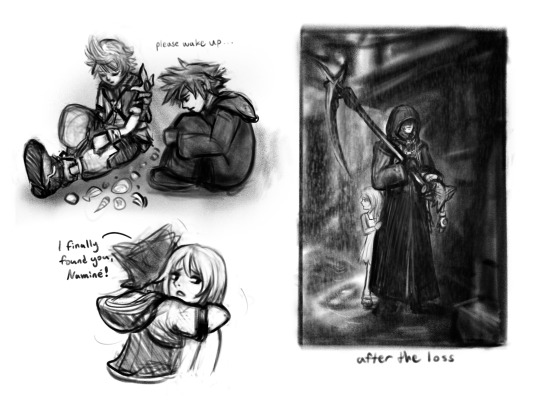

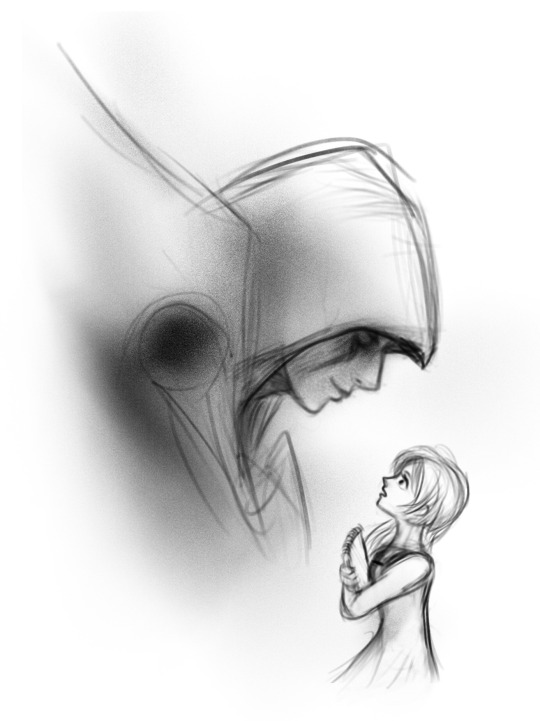
sorry if there some gaps or holes since this wasn’t an outline, i just jumped around with ideas. now to think about this more meanwhile i have other responsibilities to attend to @_@
#i need to give this a proper tag#hrmm ok#puppetplanaufic#there#a project title i guess#warning this is long#and there's some sketches!! to look at#kh#this is just all the main characters receiving the bad ending of their respective games?#um days already has a 'bad' ending but like this one is...way worse#also a bunch of identity crises!#just average kh stuff#long post#sorry the read more doesn’t work on mobile 😥
42 notes
·
View notes
Text
The Dos and Don’ts Of Living A Happier Life.
There’s no shortage of how-to guides on making money and seeking fame and fortune, but these guides tend to leave out a crucial element: what to do when all that money and success still leaves you feeling empty and unfulfilled.
You might wonder how someone with endless amounts of money could possibly feel unhappy with their life, but, as experts explain, money is no harbinger of happiness. In fact, money, fame, adoration, awards and the newest cars, clothes and gadgets can’t bring anything but a fleeting sense of happiness in the guise of pleasure.
To find sustained and meaningful happiness, we must look beyond money and the shiny new toys it can buy. We must look within ourselves, and to the steps we can take to change our perspective on the world around us, and not lose sight of the things that really make life worth living. Ahead, you’ll find a variety of tips and methods to help you develop a happy mind and a happier life.
Many people believe that happiness depends on external factors, but it doesn’t.
If someone asked you to define happiness, what would you say? Most of us assume we know what happiness is, but, if we stop to think about it, the concept becomes fuzzy. Let’s take a closer look to see if we can pin down what it is, as well as what it isn’t.
One common misconception is that happiness depends on external factors, such as material goods or events. People tend to associate happiness with nouns, like cars, vacation destinations and sexual partners, or moments in time that mark a personal or professional triumph.
What all these things have in common is that they provide only temporary moments of pleasure. As a result, people develop the impression that their happiness is tied to other people, or to whether or not a future event will occur.
This isn’t ideal, because, when your happiness is inextricably linked to external factors, you have no control over your happiness in the here and now.
You don’t have to look too hard to see that this arrangement doesn’t bode well for sustainable good cheer. In fact, the more you turn to external sources for happiness, the less happy you’ll be.
For millennia, people have lived under the misguided assumption that they can buy happiness, if only they had enough money. Yet there are numerous studies that show that wealthy people are just as miserable as anyone else.
When the average person sets out to gain money, they do so to buy all the luxury items they associate with the good life: big houses, fancy cars, massive TVs and stereos. But these things don’t just fail to bring lasting happiness, they also end up putting people into debt. The resulting financial pressure can easily send a person spiraling into more anxiety and depression than they had before they bought all their fancy toys.
Happiness isn’t found in the future or the past, and it won’t be delivered by other people.
While life is an amazing gift, it’s far from perfect. On any given day, we can be confronted with illness, heartbreak, an unexpected financial calamity or any number of anxiety-inducing events.
As a way to escape these difficult moments, we often resort to activities that take us out of the present. If you’re looking for happiness, this method of escape is actually a mistake, because happiness can only be found in the present.
When your mind isn’t focused on the present, logic dictates that you’re either ruminating on the past or fantasizing about the future. These are common places to be, since it’s easy to daydream about finding a perfect job, going on a perfect date or winning the lottery so you can pay off your student loans. Other times, you might be caught up in the past, lingering over memories of better days or cringing over a regretful thing you wish you hadn’t said at the company picnic last weekend.
Spending time in the past or the future may seem preferable, especially if there are ongoing problems in the here and now. But you can only find happiness in the present, because that is where the experience of life takes place.
In addition to spending too much time in the past or future, another common pitfall is expecting other people to bring happiness along with them when they enter your life. Many people think: if only I could find that perfect Ms. or Mr. Right, everything would be in harmony!
Of course, when that perfect person does come along, they inevitably discover that happiness didn’t magically appear. Instead of realizing that other people aren’t the key to contentment, they decide to bring yet another person into the mix: if only we had a child, then everything would be perfect!
No matter how strongly you believe someone else is the key to your happiness, the fact is that no lover, friend or child will ever be capable of providing you with the sustained, lasting happiness you seek. That kind of peace of mind can only be achieved by going inward and finding it within yourself.
Happiness is different than pleasure, and happy people have common traits.
If you have a sweet tooth, your idea of happiness might be a delectable bar of Godiva chocolate. The chocolate may be delicious, but this way of thinking reflects another common mistake: confusing pleasure with happiness.
Like money or material goods, pleasurable sensations are fleeting experiences that will never add up to a satisfying or lasting state of happiness. That doesn’t mean there’s anything wrong with pleasure, or that we shouldn’t celebrate and enjoy it. But you must keep in mind that pleasure is a sensation, and therefore unstable; in the scales of life, it will always be balanced out by sensations of pain and discomfort.
Happiness, on the other hand, can be sustained and experienced separately from the changing circumstances of your life. In other words, happiness can be relatively stable, as long as you stay in the moment and keep your attention on the positive elements. That way, even if there are feelings of pain and discomfort, it is possible to remain content and happy in life.
You may be wondering, how is this possible? This kind of steady happiness can be attained by staying aware of your emotional state, and embracing the experience of life as it is happening. Let’s say you’re feeling lonely. Instead of immediately turning on the TV to distract yourself from this feeling, stay present and accept the loneliness as a perfectly natural feeling. If you relax and tune in to yourself, you’ll find that the steadiness of happiness can exist alongside your temporary feeling of loneliness.
While there are no rules or shortcuts that work for everyone, experts have found some commonalities in those who have managed to sustain their happiness.
Happy people tend to appreciate the simple things in life: they’ll admire picturesque scenery and appreciate a good night’s sleep. They also have professions that they find motivating and engaging, and they make a point of looking after their health and wellness.
Moreover, happy people are content to be on their own, which means they tend to be selective about who they spend time with. Those they do let in as friends or partners are supportive – not the bad company that unhappy people often keep. If you think that more people will make you happier, you might be more willing to keep company with some shady characters.
Unhappiness and harmful behaviors can be triggered by survival-related fears.
Now that we have a better idea about the nature of happiness, let’s take a look at the other side of this emotional coin and see the different reasons we can end up unhappy.
One of the mysteries preoccupying modern researchers is why so many people who live an affluent life with plenty of money and creature comforts remain unhappy. One suggestion is that there are fears about survival behind this unhappiness.
When evolutionary psychologists look at the neurological wiring of the modern human brain, they see plenty of primitive connections that are still active.
A significant part of our brains’ development took place during the stone age or earlier – times when survival rates were relatively low, and we needed all the mental help we could get. Big threats to survival included getting kicked out of the tribe, or losing access to resources. Either experience could easily have been a death sentence.
These days, our survival instincts continue to be triggered by threats to our social standing, or the potential loss of valuable resources like money. If a coworker gives us the cold shoulder or the phone bill suddenly doubles, we can feel a sense of life-threatening panic that isn’t necessarily warranted by the relatively benign problem at hand. But as we inevitably encounter many of these social or financial problems throughout our days, we can experience a constant level of stress and unease that adds up to a general unhappiness.
Is it any wonder that, with all this daily anxiety, we engage in compulsive behavior intended to calm our nerves? Ironically, however, such behaviors – like binge eating junk food – tend to be far more harmful than the cold shoulder from the coworker.
Our fears are so strong that the attempt to avoid them can lead to long-term harm and unhappiness, such as when we stay with an abusive or manipulative partner. Our desire to be connected, even to someone who is bad for us, is directly related to our instinctive desire to avoid the fear of being cut loose and left to fend for ourselves.
Ultimately, if our instincts believe it to be a matter of life or death, then our happiness can suffer. Unfortunately, much of that suffering is needless these days.
Childhood trauma can increase the likelihood of chronic unhappiness, but it can be treated.
If you know someone who’s in a perpetual funk, you may feel the urge to tell them to just snap out of it. Surely they’d start feeling better if they would just get out of bed and get some sunlight, right?
Just because this kind of response works for you when you get the blues doesn’t mean it will work for someone whose past experiences have left them with a more chronic unhappiness.
A constant depressive disposition may be the result of childhood trauma.
If someone has a traumatic event in their past, especially if it occurred in their first six years, it can significantly increase the severity of those instinctive fears and inform how that person will react to rejection or scarcity.
Therefore, the quality of parenting during those formative years can greatly influence how a person will respond to the common stressful situations of everyday life. If someone’s parents provided unconditional love and support early on, they’ll have a wholly different perspective on life than the person whose parents were abusive, absent or emotionally unavailable. Indeed, not being loved as a child can be very traumatic – so much so that the effects can last a lifetime.
However, this doesn’t mean that people with a traumatic childhood are doomed to be unhappy.
Even though trauma has been linked to the mind’s instinctual response system producing more anxious reactions to the world, other areas of the brain such as the neocortex offer hope. The neocortex is the center of our conscious decision-making as well as our emotional and cognitive intelligence, and it allows us to take in new information and choose our responses.
Take someone with a history of trauma. When they stumble into a financial hole, their survival-related fears could kick into overdrive. If they take a moment to let the neocortex do its job, instead of letting the instinctual response take over, they can put the problem into perspective and come up with a solution. Rather than succumbing to fear, the person could choose to come up with a better monthly budget.
The more the neocortex is used, the stronger it gets. It can also be helpful to see a professional; therapists can help us change our perspective and look at things in a positive way.
Being happy is up to you, and it helps if you have a plan.
Money is something we can spend, borrow, loan to one another or save up for a rainy day. But happiness isn’t something we can take or borrow from another person. If you want more happiness, the only place to look is within yourself.
There are things that are out of your control, like the ups and downs of the stock market. How you respond to those peaks and valleys in life is, however, completely within your control. Since you won’t find happiness from external sources, you need to accept that it’s purely your responsibility.
Simply put, you can’t wait for the world to change and meet your expectations of a bright and happy universe. You need to take it upon yourself to shift your own perspective. Imagine the pursuit of happiness as a step-by-step process, and one that you can work on from moment to moment – with the optional support of therapy.
You can cultivate happiness by taking the time to create and maintain a solid life plan. It’s so easy to get caught up in daily, time-consuming struggles that you never find the right peaceful moment to come up with a clear-headed plan for your life. Carve out some time in your schedule, even just thirty minutes at the end of every day, to focus peacefully on your plan and on what���s going on in your life.
Your plan should include clear goals for all aspects of your life, including personal, professional and free time. When you think about these things, ask yourself: Is there too much stress in a particular area and not enough time to spend on hobbies. Is there too much sitting around and not enough income being made?
With a plan in place, you’ll be able to direct your energy to where it’s most needed, thereby taking responsibility for your happiness and well-being. You should still focus on staying grounded in the present moment, but, as you put your plan into action, you’ll have the comfort of knowing where you’re headed and what needs to be done.
To be happy, practice daily gratitude and keep things new and interesting.
There’s an old saying, “You never truly appreciate what you have until it’s gone.” Imagine losing absolutely everything: your possessions, your friends and loved ones – even your health and freedoms like traveling and voting. You’d miss them, right? Now imagine slowly getting each of these things back. How grateful would you be?
You shouldn’t have to lose things in order to be grateful for all you have. Gratitude should be something you experience daily, as it’s a powerful way to bring more happiness into your life. After all, why would you want more things in life if you’re never appreciative of what you have?
You can make a daily habit of practicing gratitude for the good things in life. A good way to get things started is by making a list of the things you currently have that you’re grateful for. Be careful not to overlook the common things that are often taken for granted.
Many people take their health for granted. Only after recovering from the flu or another illness are they reminded of what lucky people they are to live a life free of any restrictive health issues.
Also remember to take note of the small, joyful moments in life, such as finding a perfect avocado at the store or crossing paths with the stranger who has a nice smile and holds the door open for you.
Another helpful practice is to avoid falling into a mundane routine by keeping things fresh and exciting.
When your life falls into a monotonous routine, you’re essentially making sure that nothing new and exciting happens. It’s easy to forget that there is a huge and exciting world out there to discover – even in your own neighborhood! Make the effort to shake things up every so often.
If you walk to work, try taking different routes from time to time. Make sure you notice the world around you. Having an exploratory attitude toward life will stimulate your curiosity and open up your senses to the world, all of which is good for promoting higher levels of happiness.
Happiness can be found in shedding needless things and avoiding unrealistic goals.
How would you feel if you got to live in a mansion with expensive furnishings, five bedrooms, three bathrooms and a massive kitchen and yard? Now, what if you were responsible for keeping all the rooms, carpets, furniture and fixtures clean? What about maintaining that huge yard and its impeccable garden?
Having a lot of stuff comes with a lot of responsibilities, and can quickly turn into a stressful headache. No wonder many people have found happiness by heading in the other direction and letting go of the stuff they don’t really need.
When you look around your home, do you see lots of clutter? Are your closets filled with clothes you have no intention of ever wearing again? Are your shelves so filled with junk that you no longer see the stuff that really brings you joy?
Take some time to sort through your belongings and get rid of the clutter that turns a happy room into an eyesore. Not only will you discover more space, you’ll also gain a better appreciation of the books and clothes that really bring you joy. This process can happen in every room of your home, and it should apply to everything from furniture and cooking utensils to knicknacks and gadgets.
While you’re at it, think about how you can declutter your mind as well.
We are happier when we get rid of unwanted feelings, like that nagging jealousy over a friend’s recent streak of good fortune. To let go of these unwelcome thoughts, acknowledge them when they surface and then make a conscious decision to set them free. It might require several attempts before they finally stop showing up, and you might consider therapeutic help to make those efforts more effective.
In the pursuit of happiness, it’s also worth paying attention to ways you can avoid setting yourself up for disappointment.
That can easily happen when you set goals that are overambitious and far outside your reach. Of course, you should strive to be your best at work and in life, and to improve your skill set in order to make that happen. But if your goal is to play the cello better than Yo-Yo Ma in the space of five years, you may be aiming too high – and the inability to achieve your goal may ruin your enjoyment of playing the instrument altogether.
Avoid being overexposed to news media and blowing things out of proportion.
Do you ever find yourself getting tense and anxious while scrolling through a news feed full of articles about political conflicts, violence, corruption and discrimination? It’s valuable to stay informed, but your feed doesn’t always provide you with the most accurate perspective on the world.
In fact, to stay happy, it’s advisable to limit your exposure to negative media altogether.
Many media outlets put a negative or extreme spin on the news to get more attention. They all know that the public has a negativity bias, which means we focus more on a negative news story than a positive one. The reason for this goes back to those primitive survival instincts. We had to listen when someone talked about a friend getting eaten by an alligator to avoid a similarly gruesome fate.
The media shamelessly exploits our very human weakness for bad news, often ignoring the good stuff to focus disproportionately on the bad. As a result, it’s easy to look at the news and feel anxious and unhappy, since it seems like there’s nothing but misery everywhere.
Fortunately, you can prevent the media from manipulating your feelings. Knowing about this purposeful imbalance is a good start. It also helps to be mindful of which news sources you let in, and to block your exposure to especially imbalanced sources.
Finally, be aware of your own tendency to create drama and blow things out of proportion.
If your partner isn’t very good at cleaning up, you might come home after a challenging day at work and tell them that you’re fed up with how messy they are – that it’s a sign of how little they respect you. Things quickly escalate, and, before you know it, you’re having a big argument. One thing leads to another, and the result is that a loving and healthy relationship is needlessly tested.
There is a healthier perspective to have in this situation. Remember that different people have different ideas of what constitutes an unreasonable mess; failing to do some chores is not necessarily a sign of selfish behavior. The next time your loved one does something annoying, remember all the loving things they have done recently. Sustaining any relationship is a challenge, but keeping the good things in mind will help you to stay happy.
Our happiness is in our own hands. Yet, rather than looking within, people tend to seek happiness from external sources like money, gadgets and relationships. Lasting happiness will never come from these things over which we have no control – it can only come from inside. To sustain happiness, we must stay grounded in the present and have a positive outlook on the world. We must cultivate gratitude. In order to overcome our instinctive survival-related fears, we should plan and focus on realistic future goals that provide sustainable happiness in our personal and professional lives. By focusing on well-being and personal fulfillment, rather than wealth and power, we can work toward seeing the beauty around us and achieving peace and happiness.
Action Plan: Keep a bullet journal. Making a plan for a workable path to happiness is all well and good. But each and every day carries with it the potential for surprises that can send you off track, as well as plenty of distractions, like that Netflix series you’ve been waiting for.
The solution here is to keep a bullet journal, which is essentially a calendar that allows you to list daily goals, like exercising, meditating and reading. Each task can then be ticked off when you’re done, and at the end of each month you can feel the warm, happy glow of satisfaction at being able to see all you’ve accomplished.
0 notes
Text
Task T: Evaluation
TEXTUAL ANALYSIS OF MY SHORT FILM AND LINK TO FOCAL FILMS
Micro Technical Analysis
CINEMATOGRAPHY:
Extreme Close Up and Close Ups

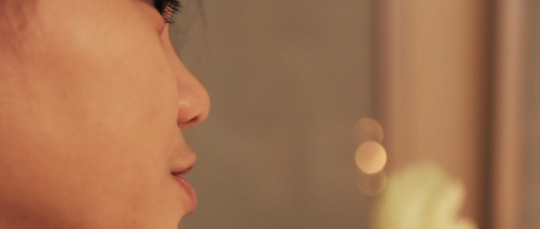

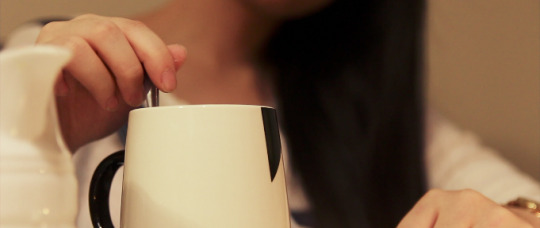

Extreme close-ups and Closes ups are used to show things in extreme detail. These types of shots I used in the film are either slow and fast paced since they are only there to highlight key scenes. I wanted to create a sense of intimacy between the characters and the audience in order for the audience to relate to the characters in the film. I wanted to include extreme close-ups to add variety and because they are visually intriguing, especially with the soft focus of certain areas and the use of shallow depth of field that such a close-up shot creates for the background of the shots. This shallow depth of field makes the focus of the shot even more distinctive and clear.
LINK TO FOCAL FILMS
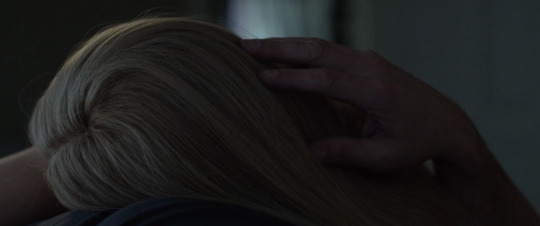



Here are examples of extreme close-ups and close-up shots in Fincher’s films: Gone Girl and Fight Club. By having such an extreme close-up, the audience is able to see every detail of the character’s face/emotions and what is surrounding them. It shows how it is the focal point of the scene and emphasises its importance.
Medium Close-ups


A medium close up allows for the person in the shot to be clear, however, it also allows for the background to be shown. This gives the audience some context as to where the character is, and also makes the shot less dominant and the subject of the shot becomes less explicit. By this, if you have a close up of someone frowning, it creates a mood of loneliness, but this as a medium shot makes the mood less obvious. I used this shot type a few times throughout my short film as it allows the audience to see the protagonists and their expressions, without using an excessive amount of close-ups, which can make the film look repetitive and might disinterest the audience.
LINK TO FOCAL FILMS
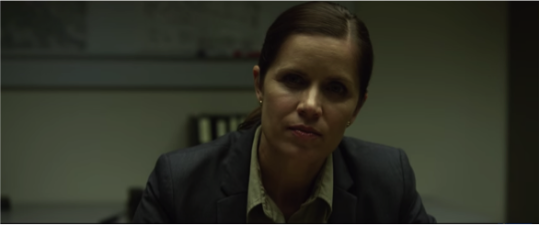


Medium close-ups allow the audience to see the detail of the characters face and expressions, while at the same time being able to see the surroundings that they are in. It is also a good shot type to use when using ‘rule of thirds’ to frame the shot. This shot type is used in Gone Girl to show the audience where the characters are in each scene and highlight what is going on as well as the audience being able to witness their emotions.
- For the cinematography in my short film, I decided to keep the shots as aesthetically pleasing as possible, but at the same time really attract the audience to what emotions, expressions and events that are happening at the time of watching. I’ve incorporated a lot of Fincher’s style of directing a scene, as he doesn’t particularly shoot a scene with hand held. This is why I only shot a scene or two using hand held effect. Most of the footage was shot using a tripod to attain a stabilised footage.
MISE-EN-SCENE
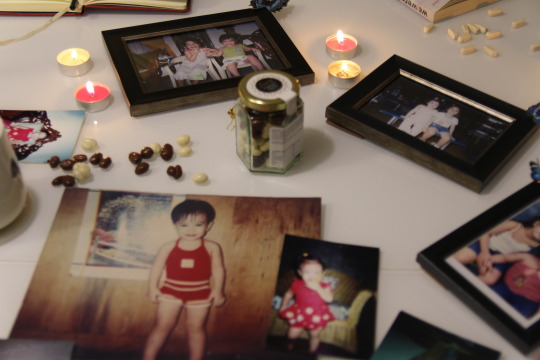
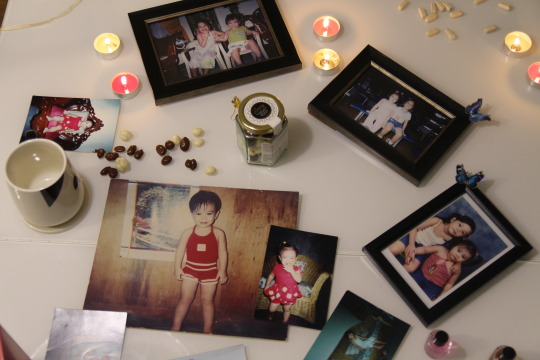
In regards to the mise-en-scene used in my film, I’ve heavily relied on making sure it is aesthetically pleasing when shot. The use of candles scattered around the table helped in creating the natural bokeh effect in some shots since the lighting is reflecting in the camera. It also enhanced the footage to look more visually dramatic, since the use of childhood photos connotes innocence and purity. There are also subtle hints in the props used, such as the poison pills scattered near the photos, it is a quick shot which if the audience is not paying attention, they could easily miss it.
SOUND
For my short film, I have decided to have characters exchange dialogues. This is also one of Fincher’s styles in filmmaking. He loves exposition between characters. This allowed me to set the mood between the two characters and the conversation that they are having may relate to the audience due to the topic of sisterhood and reminiscing old memories. I used a microphone to re-record the dialogue between the sisters to better my audio quality, as I want the audience to hear the conversation properly without the heavy background hiss.
I’ve also used a soundtrack in my short film to help develop the emotions in my film further. The used of this soundtrack helped me gradually get to the climax of the scene (Camille dying) with a heavy orchestral to highlight her death and the emotions behind it.
EDITING
My short film includes the use of continuity editing. The use of continuity editing allowed me to deliver the conversation between the two character smoothly, therefore achieving my goal of making the audience think that they really are having a conversation together, when in fact, the two characters are not since one of them is dead. In the first scene, Camille is shown writing and looking torn about what she’s writing. It also cuts to her in the same scene pouring herself a drink, which creates a sense of continuity so the audience is tricked into thinking that this is a linear narrative. The pouring of the drink in her mug is also one of the first scenes, which is a very important aspect of the entire short film, as it will eventually lead to her death.
Macro Concepts
AUTEUR THEORY
My creative investigation focussed on the auteur status of David Fincher. Directors that are argued to be the auteur of their films are said to have a “distinctive style” and have “consistent” themes throughout their body of work. I, therefore, took influenced from these factors that can be argued to make Fincher the auteur of his films. However, the counter argument to auteur theory I the use of consistent collaborators. For example, Fincher has used the same cinematographer, Jeff Cronenwethi, for many of his films. This could discount him as the auteur of his films as it is not only his “personal vision” for his films. I was the only person making my film. I wrote, shot, directed and edited the film myself meaning that you could argue that I was the auteur of the film since it was my “personal vision” however this does not make me an auteur as you need a larger body of work with a larger audience reception, like David Fincher.
Narrative
The narrative of my film is non-linear which reflects two of my focal films, Gone Girl and Fight Club. When watching the film, the audience is first tricked into thinking that the characters are together in one room, when in fact, Cristine is just responding to the pre-recorded questions of her sister that she is watching on the phone she’s holding. After the reveal, the audience can navigate through the film and understand the characters and the narrative as it ends.
The location I’ve used is limited. The whole film was shot in our house. I was sceptical about this idea because I wasn’t sure if it would be interesting enough, however, despite this, I decided to take matters into my own hand and create a very striking visual. I decided to scatter our pictures on the table and use candles and other props to attain a certain aesthetic that would fit the theme of the film.
Narrative theory
Todorov’s Theory of Equilibrium - My short film will not follow an explicit narrative but still follows some of the conventional stages. For example, at the beginning of the film, you see the protagonist writing a note and pouring herself a drink, which could imply that she’s in a content state in her life. She smiles as she drinks the contents of her mug and begins the conversation by asking: “Do you still remember that time when I punched our cousin because he was teasing you?” It opens the conversation between the sisters before Cristine (me) responds to her question and it shows the audience that the two sisters are just reminiscing old memories together. It will then show short shots of our childhood pictures together, which will illustrate the bond and intimacy between the sisters, therefore striking the audience with emotions, which they should be able to relate to. However, there is a dark turn in the film when Camille pours the powder in her drink (implied as poison) and once she drinks the contents of it, you can clearly see her slowly becoming dizzy and her breathing is slow. The sisters will continue to have a conversation, with Cristine telling her sister that she doesn’t want Camille to “leave.” Camille responds with: “Don’t worry about me, this wouldn’t hurt me at all.” Before she finally loses consciousness and dies. It will then show a close up of Cristine holding her phone looking at the same shot of Camille dying, which will show the audience that Camille has been dead all along and that Cristine was just answering the questions her sister recorded when she died. They never really had a conversation together, apart from the flashback, which is the last scene. The flashback will show Camille’s first question of: “Do you still remember that time when I punched our cousin because he was teasing you?” This could imply that she might have wanted to reach out to her sister before, but decided not to do it as the flashback ends with her saying: “Nah, you’ll be fine without me.”
SKILLS DEVELOPMENT
Some examples of how the course has influenced me:
One of the biggest influences from my course was learning about Section A of the second year exam which focuses on authorship. In particular, we focused on the director Stanley Kubrick, regarded as one of the greatest filmmakers of all time. Not only did I take influence from his own style, for example, the use of lingering, panning, voyeuristic directorial style, but I learnt about authorship and auteur theory which intrigued me into researching the work and director David Fincher. I learnt about auteur theorists like Francois Truffaut and Andrew Sarris. This intrigued me to apply the theory to Fincher’s work and create counter arguments.
The short film sequence that I produced in the first year of the course was a totally different style as to what I did for my second year. My first film was still heavily influenced by Fincher, but the theme and genre are entirely different. My second-year film is much more intimate and dramatic compared to my first short film. What remained the same, however, is the use of one location only. In both films, I shot the entire scene inside a house. Both have that close space vibe which can become overbearing, but I think worked well in both films because it needed to have that overbearing atmosphere. Not only are my films focusing on topics such as psychological issues and depression, it also tackles intimacy and relationship between characters and their inner turmoil.
Below are screenshots of my AS and A2 Film Coursework. It shows how much I’ve developed when shooting in close-up and extreme close-up. In my A2 coursework, you could clearly see the use of shallow depth of field. I believe this demonstrates how technically I have developed from my AS film as the use of the depth of field is much more pronounced and soft in my A2 film.
Not only that, I have also become much more confident in using colour grading my film. Back in AS, I heavily relied on getting away with using bad lighting by applying Black and White in my film. This allowed me to get the darker tones more pronounced without having to tweak the colours manually, unlike in my A2 Film Coursework where I had to find the ‘right’ colour tone that I wanted to suite my film.

0 notes
Text
The Dos and Don’ts Of Living A Happier Life.
There’s no shortage of how-to guides on making money and seeking fame and fortune, but these guides tend to leave out a crucial element: what to do when all that money and success still leaves you feeling empty and unfulfilled.
You might wonder how someone with endless amounts of money could possibly feel unhappy with their life, but, as experts explain, money is no harbinger of happiness. In fact, money, fame, adoration, awards and the newest cars, clothes and gadgets can’t bring anything but a fleeting sense of happiness in the guise of pleasure.
To find sustained and meaningful happiness, we must look beyond money and the shiny new toys it can buy. We must look within ourselves, and to the steps we can take to change our perspective on the world around us, and not lose sight of the things that really make life worth living. Ahead, you’ll find a variety of tips and methods to help you develop a happy mind and a happier life.
Many people believe that happiness depends on external factors, but it doesn’t.
If someone asked you to define happiness, what would you say? Most of us assume we know what happiness is, but, if we stop to think about it, the concept becomes fuzzy. Let’s take a closer look to see if we can pin down what it is, as well as what it isn’t.
One common misconception is that happiness depends on external factors, such as material goods or events. People tend to associate happiness with nouns, like cars, vacation destinations and sexual partners, or moments in time that mark a personal or professional triumph.
What all these things have in common is that they provide only temporary moments of pleasure. As a result, people develop the impression that their happiness is tied to other people, or to whether or not a future event will occur.
This isn’t ideal, because, when your happiness is inextricably linked to external factors, you have no control over your happiness in the here and now.
You don’t have to look too hard to see that this arrangement doesn’t bode well for sustainable good cheer. In fact, the more you turn to external sources for happiness, the less happy you’ll be.
For millennia, people have lived under the misguided assumption that they can buy happiness, if only they had enough money. Yet there are numerous studies that show that wealthy people are just as miserable as anyone else.
When the average person sets out to gain money, they do so to buy all the luxury items they associate with the good life: big houses, fancy cars, massive TVs and stereos. But these things don’t just fail to bring lasting happiness, they also end up putting people into debt. The resulting financial pressure can easily send a person spiraling into more anxiety and depression than they had before they bought all their fancy toys.
Happiness isn’t found in the future or the past, and it won’t be delivered by other people.
While life is an amazing gift, it’s far from perfect. On any given day, we can be confronted with illness, heartbreak, an unexpected financial calamity or any number of anxiety-inducing events.
As a way to escape these difficult moments, we often resort to activities that take us out of the present. If you’re looking for happiness, this method of escape is actually a mistake, because happiness can only be found in the present.
When your mind isn’t focused on the present, logic dictates that you’re either ruminating on the past or fantasizing about the future. These are common places to be, since it’s easy to daydream about finding a perfect job, going on a perfect date or winning the lottery so you can pay off your student loans. Other times, you might be caught up in the past, lingering over memories of better days or cringing over a regretful thing you wish you hadn’t said at the company picnic last weekend.
Spending time in the past or the future may seem preferable, especially if there are ongoing problems in the here and now. But you can only find happiness in the present, because that is where the experience of life takes place.
In addition to spending too much time in the past or future, another common pitfall is expecting other people to bring happiness along with them when they enter your life. Many people think: if only I could find that perfect Ms. or Mr. Right, everything would be in harmony!
Of course, when that perfect person does come along, they inevitably discover that happiness didn’t magically appear. Instead of realizing that other people aren’t the key to contentment, they decide to bring yet another person into the mix: if only we had a child, then everything would be perfect!
No matter how strongly you believe someone else is the key to your happiness, the fact is that no lover, friend or child will ever be capable of providing you with the sustained, lasting happiness you seek. That kind of peace of mind can only be achieved by going inward and finding it within yourself.
Happiness is different than pleasure, and happy people have common traits.
If you have a sweet tooth, your idea of happiness might be a delectable bar of Godiva chocolate. The chocolate may be delicious, but this way of thinking reflects another common mistake: confusing pleasure with happiness.
Like money or material goods, pleasurable sensations are fleeting experiences that will never add up to a satisfying or lasting state of happiness. That doesn’t mean there’s anything wrong with pleasure, or that we shouldn’t celebrate and enjoy it. But you must keep in mind that pleasure is a sensation, and therefore unstable; in the scales of life, it will always be balanced out by sensations of pain and discomfort.
Happiness, on the other hand, can be sustained and experienced separately from the changing circumstances of your life. In other words, happiness can be relatively stable, as long as you stay in the moment and keep your attention on the positive elements. That way, even if there are feelings of pain and discomfort, it is possible to remain content and happy in life.
You may be wondering, how is this possible? This kind of steady happiness can be attained by staying aware of your emotional state, and embracing the experience of life as it is happening. Let’s say you’re feeling lonely. Instead of immediately turning on the TV to distract yourself from this feeling, stay present and accept the loneliness as a perfectly natural feeling. If you relax and tune in to yourself, you’ll find that the steadiness of happiness can exist alongside your temporary feeling of loneliness.
While there are no rules or shortcuts that work for everyone, experts have found some commonalities in those who have managed to sustain their happiness.
Happy people tend to appreciate the simple things in life: they’ll admire picturesque scenery and appreciate a good night’s sleep. They also have professions that they find motivating and engaging, and they make a point of looking after their health and wellness.
Moreover, happy people are content to be on their own, which means they tend to be selective about who they spend time with. Those they do let in as friends or partners are supportive – not the bad company that unhappy people often keep. If you think that more people will make you happier, you might be more willing to keep company with some shady characters.
Unhappiness and harmful behaviors can be triggered by survival-related fears.
Now that we have a better idea about the nature of happiness, let’s take a look at the other side of this emotional coin and see the different reasons we can end up unhappy.
One of the mysteries preoccupying modern researchers is why so many people who live an affluent life with plenty of money and creature comforts remain unhappy. One suggestion is that there are fears about survival behind this unhappiness.
When evolutionary psychologists look at the neurological wiring of the modern human brain, they see plenty of primitive connections that are still active.
A significant part of our brains’ development took place during the stone age or earlier – times when survival rates were relatively low, and we needed all the mental help we could get. Big threats to survival included getting kicked out of the tribe, or losing access to resources. Either experience could easily have been a death sentence.
These days, our survival instincts continue to be triggered by threats to our social standing, or the potential loss of valuable resources like money. If a coworker gives us the cold shoulder or the phone bill suddenly doubles, we can feel a sense of life-threatening panic that isn’t necessarily warranted by the relatively benign problem at hand. But as we inevitably encounter many of these social or financial problems throughout our days, we can experience a constant level of stress and unease that adds up to a general unhappiness.
Is it any wonder that, with all this daily anxiety, we engage in compulsive behavior intended to calm our nerves? Ironically, however, such behaviors – like binge eating junk food – tend to be far more harmful than the cold shoulder from the coworker.
Our fears are so strong that the attempt to avoid them can lead to long-term harm and unhappiness, such as when we stay with an abusive or manipulative partner. Our desire to be connected, even to someone who is bad for us, is directly related to our instinctive desire to avoid the fear of being cut loose and left to fend for ourselves.
Ultimately, if our instincts believe it to be a matter of life or death, then our happiness can suffer. Unfortunately, much of that suffering is needless these days.
Childhood trauma can increase the likelihood of chronic unhappiness, but it can be treated.
If you know someone who’s in a perpetual funk, you may feel the urge to tell them to just snap out of it. Surely they’d start feeling better if they would just get out of bed and get some sunlight, right?
Just because this kind of response works for you when you get the blues doesn’t mean it will work for someone whose past experiences have left them with a more chronic unhappiness.
A constant depressive disposition may be the result of childhood trauma.
If someone has a traumatic event in their past, especially if it occurred in their first six years, it can significantly increase the severity of those instinctive fears and inform how that person will react to rejection or scarcity.
Therefore, the quality of parenting during those formative years can greatly influence how a person will respond to the common stressful situations of everyday life. If someone’s parents provided unconditional love and support early on, they’ll have a wholly different perspective on life than the person whose parents were abusive, absent or emotionally unavailable. Indeed, not being loved as a child can be very traumatic – so much so that the effects can last a lifetime.
However, this doesn’t mean that people with a traumatic childhood are doomed to be unhappy.
Even though trauma has been linked to the mind’s instinctual response system producing more anxious reactions to the world, other areas of the brain such as the neocortex offer hope. The neocortex is the center of our conscious decision-making as well as our emotional and cognitive intelligence, and it allows us to take in new information and choose our responses.
Take someone with a history of trauma. When they stumble into a financial hole, their survival-related fears could kick into overdrive. If they take a moment to let the neocortex do its job, instead of letting the instinctual response take over, they can put the problem into perspective and come up with a solution. Rather than succumbing to fear, the person could choose to come up with a better monthly budget.
The more the neocortex is used, the stronger it gets. It can also be helpful to see a professional; therapists can help us change our perspective and look at things in a positive way.
Being happy is up to you, and it helps if you have a plan.
Money is something we can spend, borrow, loan to one another or save up for a rainy day. But happiness isn’t something we can take or borrow from another person. If you want more happiness, the only place to look is within yourself.
There are things that are out of your control, like the ups and downs of the stock market. How you respond to those peaks and valleys in life is, however, completely within your control. Since you won’t find happiness from external sources, you need to accept that it’s purely your responsibility.
Simply put, you can’t wait for the world to change and meet your expectations of a bright and happy universe. You need to take it upon yourself to shift your own perspective. Imagine the pursuit of happiness as a step-by-step process, and one that you can work on from moment to moment – with the optional support of therapy.
You can cultivate happiness by taking the time to create and maintain a solid life plan. It’s so easy to get caught up in daily, time-consuming struggles that you never find the right peaceful moment to come up with a clear-headed plan for your life. Carve out some time in your schedule, even just thirty minutes at the end of every day, to focus peacefully on your plan and on what’s going on in your life.
Your plan should include clear goals for all aspects of your life, including personal, professional and free time. When you think about these things, ask yourself: Is there too much stress in a particular area and not enough time to spend on hobbies. Is there too much sitting around and not enough income being made?
With a plan in place, you’ll be able to direct your energy to where it’s most needed, thereby taking responsibility for your happiness and well-being. You should still focus on staying grounded in the present moment, but, as you put your plan into action, you’ll have the comfort of knowing where you’re headed and what needs to be done.
To be happy, practice daily gratitude and keep things new and interesting.
There’s an old saying, “You never truly appreciate what you have until it’s gone.” Imagine losing absolutely everything: your possessions, your friends and loved ones – even your health and freedoms like traveling and voting. You’d miss them, right? Now imagine slowly getting each of these things back. How grateful would you be?
You shouldn’t have to lose things in order to be grateful for all you have. Gratitude should be something you experience daily, as it’s a powerful way to bring more happiness into your life. After all, why would you want more things in life if you’re never appreciative of what you have?
You can make a daily habit of practicing gratitude for the good things in life. A good way to get things started is by making a list of the things you currently have that you’re grateful for. Be careful not to overlook the common things that are often taken for granted.
Many people take their health for granted. Only after recovering from the flu or another illness are they reminded of what lucky people they are to live a life free of any restrictive health issues.
Also remember to take note of the small, joyful moments in life, such as finding a perfect avocado at the store or crossing paths with the stranger who has a nice smile and holds the door open for you.
Another helpful practice is to avoid falling into a mundane routine by keeping things fresh and exciting.
When your life falls into a monotonous routine, you’re essentially making sure that nothing new and exciting happens. It’s easy to forget that there is a huge and exciting world out there to discover – even in your own neighborhood! Make the effort to shake things up every so often.
If you walk to work, try taking different routes from time to time. Make sure you notice the world around you. Having an exploratory attitude toward life will stimulate your curiosity and open up your senses to the world, all of which is good for promoting higher levels of happiness.
Happiness can be found in shedding needless things and avoiding unrealistic goals.
How would you feel if you got to live in a mansion with expensive furnishings, five bedrooms, three bathrooms and a massive kitchen and yard? Now, what if you were responsible for keeping all the rooms, carpets, furniture and fixtures clean? What about maintaining that huge yard and its impeccable garden?
Having a lot of stuff comes with a lot of responsibilities, and can quickly turn into a stressful headache. No wonder many people have found happiness by heading in the other direction and letting go of the stuff they don’t really need.
When you look around your home, do you see lots of clutter? Are your closets filled with clothes you have no intention of ever wearing again? Are your shelves so filled with junk that you no longer see the stuff that really brings you joy?
Take some time to sort through your belongings and get rid of the clutter that turns a happy room into an eyesore. Not only will you discover more space, you’ll also gain a better appreciation of the books and clothes that really bring you joy. This process can happen in every room of your home, and it should apply to everything from furniture and cooking utensils to knicknacks and gadgets.
While you’re at it, think about how you can declutter your mind as well.
We are happier when we get rid of unwanted feelings, like that nagging jealousy over a friend’s recent streak of good fortune. To let go of these unwelcome thoughts, acknowledge them when they surface and then make a conscious decision to set them free. It might require several attempts before they finally stop showing up, and you might consider therapeutic help to make those efforts more effective.
In the pursuit of happiness, it’s also worth paying attention to ways you can avoid setting yourself up for disappointment.
That can easily happen when you set goals that are overambitious and far outside your reach. Of course, you should strive to be your best at work and in life, and to improve your skill set in order to make that happen. But if your goal is to play the cello better than Yo-Yo Ma in the space of five years, you may be aiming too high – and the inability to achieve your goal may ruin your enjoyment of playing the instrument altogether.
Avoid being overexposed to news media and blowing things out of proportion.
Do you ever find yourself getting tense and anxious while scrolling through a news feed full of articles about political conflicts, violence, corruption and discrimination? It’s valuable to stay informed, but your feed doesn’t always provide you with the most accurate perspective on the world.
In fact, to stay happy, it’s advisable to limit your exposure to negative media altogether.
Many media outlets put a negative or extreme spin on the news to get more attention. They all know that the public has a negativity bias, which means we focus more on a negative news story than a positive one. The reason for this goes back to those primitive survival instincts. We had to listen when someone talked about a friend getting eaten by an alligator to avoid a similarly gruesome fate.
The media shamelessly exploits our very human weakness for bad news, often ignoring the good stuff to focus disproportionately on the bad. As a result, it’s easy to look at the news and feel anxious and unhappy, since it seems like there’s nothing but misery everywhere.
Fortunately, you can prevent the media from manipulating your feelings. Knowing about this purposeful imbalance is a good start. It also helps to be mindful of which news sources you let in, and to block your exposure to especially imbalanced sources.
Finally, be aware of your own tendency to create drama and blow things out of proportion.
If your partner isn’t very good at cleaning up, you might come home after a challenging day at work and tell them that you’re fed up with how messy they are – that it’s a sign of how little they respect you. Things quickly escalate, and, before you know it, you’re having a big argument. One thing leads to another, and the result is that a loving and healthy relationship is needlessly tested.
There is a healthier perspective to have in this situation. Remember that different people have different ideas of what constitutes an unreasonable mess; failing to do some chores is not necessarily a sign of selfish behavior. The next time your loved one does something annoying, remember all the loving things they have done recently. Sustaining any relationship is a challenge, but keeping the good things in mind will help you to stay happy.
Our happiness is in our own hands. Yet, rather than looking within, people tend to seek happiness from external sources like money, gadgets and relationships. Lasting happiness will never come from these things over which we have no control – it can only come from inside. To sustain happiness, we must stay grounded in the present and have a positive outlook on the world. We must cultivate gratitude. In order to overcome our instinctive survival-related fears, we should plan and focus on realistic future goals that provide sustainable happiness in our personal and professional lives. By focusing on well-being and personal fulfillment, rather than wealth and power, we can work toward seeing the beauty around us and achieving peace and happiness.
Action Plan: Keep a bullet journal. Making a plan for a workable path to happiness is all well and good. But each and every day carries with it the potential for surprises that can send you off track, as well as plenty of distractions, like that Netflix series you’ve been waiting for.
The solution here is to keep a bullet journal, which is essentially a calendar that allows you to list daily goals, like exercising, meditating and reading. Each task can then be ticked off when you’re done, and at the end of each month you can feel the warm, happy glow of satisfaction at being able to see all you’ve accomplished.
0 notes
Text
The Dos and Don’ts Of Living A Happier Life.
There’s no shortage of how-to guides on making money and seeking fame and fortune, but these guides tend to leave out a crucial element: what to do when all that money and success still leaves you feeling empty and unfulfilled.
You might wonder how someone with endless amounts of money could possibly feel unhappy with their life, but, as experts explain, money is no harbinger of happiness. In fact, money, fame, adoration, awards and the newest cars, clothes and gadgets can’t bring anything but a fleeting sense of happiness in the guise of pleasure.
To find sustained and meaningful happiness, we must look beyond money and the shiny new toys it can buy. We must look within ourselves, and to the steps we can take to change our perspective on the world around us, and not lose sight of the things that really make life worth living. Ahead, you’ll find a variety of tips and methods to help you develop a happy mind and a happier life.
Many people believe that happiness depends on external factors, but it doesn’t.
If someone asked you to define happiness, what would you say? Most of us assume we know what happiness is, but, if we stop to think about it, the concept becomes fuzzy. Let’s take a closer look to see if we can pin down what it is, as well as what it isn’t.
One common misconception is that happiness depends on external factors, such as material goods or events. People tend to associate happiness with nouns, like cars, vacation destinations and sexual partners, or moments in time that mark a personal or professional triumph.
What all these things have in common is that they provide only temporary moments of pleasure. As a result, people develop the impression that their happiness is tied to other people, or to whether or not a future event will occur.
This isn’t ideal, because, when your happiness is inextricably linked to external factors, you have no control over your happiness in the here and now.
You don’t have to look too hard to see that this arrangement doesn’t bode well for sustainable good cheer. In fact, the more you turn to external sources for happiness, the less happy you’ll be.
For millennia, people have lived under the misguided assumption that they can buy happiness, if only they had enough money. Yet there are numerous studies that show that wealthy people are just as miserable as anyone else.
When the average person sets out to gain money, they do so to buy all the luxury items they associate with the good life: big houses, fancy cars, massive TVs and stereos. But these things don’t just fail to bring lasting happiness, they also end up putting people into debt. The resulting financial pressure can easily send a person spiraling into more anxiety and depression than they had before they bought all their fancy toys.
Happiness isn’t found in the future or the past, and it won’t be delivered by other people.
While life is an amazing gift, it’s far from perfect. On any given day, we can be confronted with illness, heartbreak, an unexpected financial calamity or any number of anxiety-inducing events.
As a way to escape these difficult moments, we often resort to activities that take us out of the present. If you’re looking for happiness, this method of escape is actually a mistake, because happiness can only be found in the present.
When your mind isn’t focused on the present, logic dictates that you’re either ruminating on the past or fantasizing about the future. These are common places to be, since it’s easy to daydream about finding a perfect job, going on a perfect date or winning the lottery so you can pay off your student loans. Other times, you might be caught up in the past, lingering over memories of better days or cringing over a regretful thing you wish you hadn’t said at the company picnic last weekend.
Spending time in the past or the future may seem preferable, especially if there are ongoing problems in the here and now. But you can only find happiness in the present, because that is where the experience of life takes place.
In addition to spending too much time in the past or future, another common pitfall is expecting other people to bring happiness along with them when they enter your life. Many people think: if only I could find that perfect Ms. or Mr. Right, everything would be in harmony!
Of course, when that perfect person does come along, they inevitably discover that happiness didn’t magically appear. Instead of realizing that other people aren’t the key to contentment, they decide to bring yet another person into the mix: if only we had a child, then everything would be perfect!
No matter how strongly you believe someone else is the key to your happiness, the fact is that no lover, friend or child will ever be capable of providing you with the sustained, lasting happiness you seek. That kind of peace of mind can only be achieved by going inward and finding it within yourself.
Happiness is different than pleasure, and happy people have common traits.
If you have a sweet tooth, your idea of happiness might be a delectable bar of Godiva chocolate. The chocolate may be delicious, but this way of thinking reflects another common mistake: confusing pleasure with happiness.
Like money or material goods, pleasurable sensations are fleeting experiences that will never add up to a satisfying or lasting state of happiness. That doesn’t mean there’s anything wrong with pleasure, or that we shouldn’t celebrate and enjoy it. But you must keep in mind that pleasure is a sensation, and therefore unstable; in the scales of life, it will always be balanced out by sensations of pain and discomfort.
Happiness, on the other hand, can be sustained and experienced separately from the changing circumstances of your life. In other words, happiness can be relatively stable, as long as you stay in the moment and keep your attention on the positive elements. That way, even if there are feelings of pain and discomfort, it is possible to remain content and happy in life.
You may be wondering, how is this possible? This kind of steady happiness can be attained by staying aware of your emotional state, and embracing the experience of life as it is happening. Let’s say you’re feeling lonely. Instead of immediately turning on the TV to distract yourself from this feeling, stay present and accept the loneliness as a perfectly natural feeling. If you relax and tune in to yourself, you’ll find that the steadiness of happiness can exist alongside your temporary feeling of loneliness.
While there are no rules or shortcuts that work for everyone, experts have found some commonalities in those who have managed to sustain their happiness.
Happy people tend to appreciate the simple things in life: they’ll admire picturesque scenery and appreciate a good night’s sleep. They also have professions that they find motivating and engaging, and they make a point of looking after their health and wellness.
Moreover, happy people are content to be on their own, which means they tend to be selective about who they spend time with. Those they do let in as friends or partners are supportive – not the bad company that unhappy people often keep. If you think that more people will make you happier, you might be more willing to keep company with some shady characters.
Unhappiness and harmful behaviors can be triggered by survival-related fears.
Now that we have a better idea about the nature of happiness, let’s take a look at the other side of this emotional coin and see the different reasons we can end up unhappy.
One of the mysteries preoccupying modern researchers is why so many people who live an affluent life with plenty of money and creature comforts remain unhappy. One suggestion is that there are fears about survival behind this unhappiness.
When evolutionary psychologists look at the neurological wiring of the modern human brain, they see plenty of primitive connections that are still active.
A significant part of our brains’ development took place during the stone age or earlier – times when survival rates were relatively low, and we needed all the mental help we could get. Big threats to survival included getting kicked out of the tribe, or losing access to resources. Either experience could easily have been a death sentence.
These days, our survival instincts continue to be triggered by threats to our social standing, or the potential loss of valuable resources like money. If a coworker gives us the cold shoulder or the phone bill suddenly doubles, we can feel a sense of life-threatening panic that isn’t necessarily warranted by the relatively benign problem at hand. But as we inevitably encounter many of these social or financial problems throughout our days, we can experience a constant level of stress and unease that adds up to a general unhappiness.
Is it any wonder that, with all this daily anxiety, we engage in compulsive behavior intended to calm our nerves? Ironically, however, such behaviors – like binge eating junk food – tend to be far more harmful than the cold shoulder from the coworker.
Our fears are so strong that the attempt to avoid them can lead to long-term harm and unhappiness, such as when we stay with an abusive or manipulative partner. Our desire to be connected, even to someone who is bad for us, is directly related to our instinctive desire to avoid the fear of being cut loose and left to fend for ourselves.
Ultimately, if our instincts believe it to be a matter of life or death, then our happiness can suffer. Unfortunately, much of that suffering is needless these days.
Childhood trauma can increase the likelihood of chronic unhappiness, but it can be treated.
If you know someone who’s in a perpetual funk, you may feel the urge to tell them to just snap out of it. Surely they’d start feeling better if they would just get out of bed and get some sunlight, right?
Just because this kind of response works for you when you get the blues doesn’t mean it will work for someone whose past experiences have left them with a more chronic unhappiness.
A constant depressive disposition may be the result of childhood trauma. If someone has a traumatic event in their past, especially if it occurred in their first six years, it can significantly increase the severity of those instinctive fears and inform how that person will react to rejection or scarcity.
Therefore, the quality of parenting during those formative years can greatly influence how a person will respond to the common stressful situations of everyday life. If someone’s parents provided unconditional love and support early on, they’ll have a wholly different perspective on life than the person whose parents were abusive, absent or emotionally unavailable. Indeed, not being loved as a child can be very traumatic – so much so that the effects can last a lifetime.
However, this doesn’t mean that people with a traumatic childhood are doomed to be unhappy. Even though trauma has been linked to the mind’s instinctual response system producing more anxious reactions to the world, other areas of the brain such as the neocortex offer hope. The neocortex is the center of our conscious decision-making as well as our emotional and cognitive intelligence, and it allows us to take in new information and choose our responses.
Take someone with a history of trauma. When they stumble into a financial hole, their survival-related fears could kick into overdrive. If they take a moment to let the neocortex do its job, instead of letting the instinctual response take over, they can put the problem into perspective and come up with a solution. Rather than succumbing to fear, the person could choose to come up with a better monthly budget.
The more the neocortex is used, the stronger it gets. It can also be helpful to see a professional; therapists can help us change our perspective and look at things in a positive way.
Being happy is up to you, and it helps if you have a plan.
Money is something we can spend, borrow, loan to one another or save up for a rainy day. But happiness isn’t something we can take or borrow from another person. If you want more happiness, the only place to look is within yourself.
There are things that are out of your control, like the ups and downs of the stock market. How you respond to those peaks and valleys in life is, however, completely within your control. Since you won’t find happiness from external sources, you need to accept that it’s purely your responsibility.
Simply put, you can’t wait for the world to change and meet your expectations of a bright and happy universe. You need to take it upon yourself to shift your own perspective. Imagine the pursuit of happiness as a step-by-step process, and one that you can work on from moment to moment – with the optional support of therapy.
You can cultivate happiness by taking the time to create and maintain a solid life plan. It’s so easy to get caught up in daily, time-consuming struggles that you never find the right peaceful moment to come up with a clear-headed plan for your life. Carve out some time in your schedule, even just thirty minutes at the end of every day, to focus peacefully on your plan and on what’s going on in your life.
Your plan should include clear goals for all aspects of your life, including personal, professional and free time. When you think about these things, ask yourself: Is there too much stress in a particular area and not enough time to spend on hobbies. Is there too much sitting around and not enough income being made?
With a plan in place, you’ll be able to direct your energy to where it’s most needed, thereby taking responsibility for your happiness and well-being. You should still focus on staying grounded in the present moment, but, as you put your plan into action, you’ll have the comfort of knowing where you’re headed and what needs to be done.
To be happy, practice daily gratitude and keep things new and interesting.
There’s an old saying, “You never truly appreciate what you have until it’s gone.” Imagine losing absolutely everything: your possessions, your friends and loved ones – even your health and freedoms like traveling and voting. You’d miss them, right? Now imagine slowly getting each of these things back.How grateful would you be?
You shouldn’t have to lose things in order to be grateful for all you have. Gratitude should be something you experience daily, as it’s a powerful way to bring more happiness into your life. After all, why would you want more things in life if you’re never appreciative of what you have?
You can make a daily habit of practicing gratitude for the good things in life. A good way to get things started is by making a list of the things you currently have that you’re grateful for. Be careful not to overlook the common things that are often taken for granted.
Many people take their health for granted. Only after recovering from the flu or another illness are they reminded of what lucky people they are to live a life free of any restrictive health issues.
Also remember to take note of the small, joyful moments in life, such as finding a perfect avocado at the store or crossing paths with the stranger who has a nice smile and holds the door open for you.
Another helpful practice is to avoid falling into a mundane routine by keeping things fresh and exciting.
When your life falls into a monotonous routine, you’re essentially making sure that nothing new and exciting happens. It’s easy to forget that there is a huge and exciting world out there to discover – even in your own neighborhood! Make the effort to shake things up every so often.
If you walk to work, try taking different routes from time to time. Make sure you notice the world around you. Having an exploratory attitude toward life will stimulate your curiosity and open up your senses to the world, all of which is good for promoting higher levels of happiness.
Happiness can be found in shedding needless things and avoiding unrealistic goals.
How would you feel if you got to live in a mansion with expensive furnishings, five bedrooms, three bathrooms and a massive kitchen and yard? Now, what if you were responsible for keeping all the rooms, carpets, furniture and fixtures clean? What about maintaining that huge yard and its impeccable garden?
Having a lot of stuff comes with a lot of responsibilities, and can quickly turn into a stressful headache. No wonder many people have found happiness by heading in the other direction and letting go of the stuff they don’t really need.
When you look around your home, do you see lots of clutter? Are your closets filled with clothes you have no intention of ever wearing again? Are your shelves so filled with junk that you no longer see the stuff that really brings you joy?
Take some time to sort through your belongings and get rid of the clutter that turns a happy room into an eyesore. Not only will you discover more space, you’ll also gain a better appreciation of the books and clothes that really bring you joy. This process can happen in every room of your home, and it should apply to everything from furniture and cooking utensils to knicknacks and gadgets.
While you’re at it, think about how you can declutter your mind as well. We are happier when we get rid of unwanted feelings, like that nagging jealousy over a friend’s recent streak of good fortune. To let go of these unwelcome thoughts, acknowledge them when they surface and then make a conscious decision to set them free. It might require several attempts before they finally stop showing up, and you might consider therapeutic help to make those efforts more effective.
In the pursuit of happiness, it’s also worth paying attention to ways you can avoid setting yourself up for disappointment.
That can easily happen when you set goals that are overambitious and far outside your reach. Of course, you should strive to be your best at work and in life, and to improve your skill set in order to make that happen. But if your goal is to play the cello better than Yo-Yo Ma in the space of five years, you may be aiming too high – and the inability to achieve your goal may ruin your enjoyment of playing the instrument altogether.
Avoid being overexposed to news media and blowing things out of proportion.
Do you ever find yourself getting tense and anxious while scrolling through a news feed full of articles about political conflicts, violence, corruption and discrimination? It’s valuable to stay informed, but your feed doesn’t always provide you with the most accurate perspective on the world.
In fact, to stay happy, it’s advisable to limit your exposure to negative media altogether. Many media outlets put a negative or extreme spin on the news to get more attention. They all know that the public has a negativity bias, which means we focus more on a negative news story than a positive one. The reason for this goes back to those primitive survival instincts. We had to listen when someone talked about a friend getting eaten by an alligator to avoid a similarly gruesome fate.
The media shamelessly exploits our very human weakness for bad news, often ignoring the good stuff to focus disproportionately on the bad. As a result, it’s easy to look at the news and feel anxious and unhappy, since it seems like there’s nothing but misery everywhere.
Fortunately, you can prevent the media from manipulating your feelings. Knowing about this purposeful imbalance is a good start. It also helps to be mindful of which news sources you let in, and to block your exposure to especially imbalanced sources.
Finally, be aware of your own tendency to create drama and blow things out of proportion. If your partner isn’t very good at cleaning up, you might come home after a challenging day at work and tell them that you’re fed up with how messy they are – that it’s a sign of how little they respect you. Things quickly escalate, and, before you know it, you’re having a big argument. One thing leads to another, and the result is that a loving and healthy relationship is needlessly tested.
There is a healthier perspective to have in this situation. Remember that different people have different ideas of what constitutes an unreasonable mess; failing to do some chores is not necessarily a sign of selfish behavior. The next time your loved one does something annoying, remember all the loving things they have done recently. Sustaining any relationship is a challenge, but keeping the good things in mind will help you to stay happy.
Our happiness is in our own hands. Yet, rather than looking within, people tend to seek happiness from external sources like money, gadgets and relationships. Lasting happiness will never come from these things over which we have no control – it can only come from inside. To sustain happiness, we must stay grounded in the present and have a positive outlook on the world. We must cultivate gratitude. In order to overcome our instinctive survival-related fears, we should plan and focus on realistic future goals that provide sustainable happiness in our personal and professional lives. By focusing on well-being and personal fulfillment, rather than wealth and power, we can work toward seeing the beauty around us and achieving peace and happiness.
Action plan : Keep a bullet journal.
Making a plan for a workable path to happiness is all well and good. But each and every day carries with it the potential for surprises that can send you off track, as well as plenty of distractions, like that Netflix series you’ve been waiting for.
The solution here is to keep a bullet journal, which is essentially a calendar that allows you to list daily goals, like exercising, meditating and reading. Each task can then be ticked off when you’re done, and at the end of each month you can feel the warm, happy glow of satisfaction at being able to see all you’ve accomplished.
0 notes
Text
The Dos and Don’ts Of Living A Happier Life.
There’s no shortage of how-to guides on making money and seeking fame and fortune, but these guides tend to leave out a crucial element: what to do when all that money and success still leaves you feeling empty and unfulfilled.
You might wonder how someone with endless amounts of money could possibly feel unhappy with their life, but, as experts explain, money is no harbinger of happiness. In fact, money, fame, adoration, awards and the newest cars, clothes and gadgets can’t bring anything but a fleeting sense of happiness in the guise of pleasure.
To find sustained and meaningful happiness, we must look beyond money and the shiny new toys it can buy. We must look within ourselves, and to the steps we can take to change our perspective on the world around us, and not lose sight of the things that really make life worth living. Ahead, you’ll find a variety of tips and methods to help you develop a happy mind and a happier life.
Many people believe that happiness depends on external factors, but it doesn’t.
If someone asked you to define happiness, what would you say? Most of us assume we know what happiness is, but, if we stop to think about it, the concept becomes fuzzy. Let’s take a closer look to see if we can pin down what it is, as well as what it isn’t.
One common misconception is that happiness depends on external factors, such as material goods or events. People tend to associate happiness with nouns, like cars, vacation destinations and sexual partners, or moments in time that mark a personal or professional triumph.
What all these things have in common is that they provide only temporary moments of pleasure. As a result, people develop the impression that their happiness is tied to other people, or to whether or not a future event will occur.
This isn’t ideal, because, when your happiness is inextricably linked to external factors, you have no control over your happiness in the here and now.
You don’t have to look too hard to see that this arrangement doesn’t bode well for sustainable good cheer. In fact, the more you turn to external sources for happiness, the less happy you’ll be.
For millennia, people have lived under the misguided assumption that they can buy happiness, if only they had enough money. Yet there are numerous studies that show that wealthy people are just as miserable as anyone else.
When the average person sets out to gain money, they do so to buy all the luxury items they associate with the good life: big houses, fancy cars, massive TVs and stereos. But these things don’t just fail to bring lasting happiness, they also end up putting people into debt. The resulting financial pressure can easily send a person spiraling into more anxiety and depression than they had before they bought all their fancy toys.
Happiness isn’t found in the future or the past, and it won’t be delivered by other people.
While life is an amazing gift, it’s far from perfect. On any given day, we can be confronted with illness, heartbreak, an unexpected financial calamity or any number of anxiety-inducing events.
As a way to escape these difficult moments, we often resort to activities that take us out of the present. If you’re looking for happiness, this method of escape is actually a mistake, because happiness can only be found in the present.
When your mind isn’t focused on the present, logic dictates that you’re either ruminating on the past or fantasizing about the future. These are common places to be, since it’s easy to daydream about finding a perfect job, going on a perfect date or winning the lottery so you can pay off your student loans. Other times, you might be caught up in the past, lingering over memories of better days or cringing over a regretful thing you wish you hadn’t said at the company picnic last weekend.
Spending time in the past or the future may seem preferable, especially if there are ongoing problems in the here and now. But you can only find happiness in the present, because that is where the experience of life takes place.
In addition to spending too much time in the past or future, another common pitfall is expecting other people to bring happiness along with them when they enter your life. Many people think: if only I could find that perfect Ms. or Mr. Right, everything would be in harmony!
Of course, when that perfect person does come along, they inevitably discover that happiness didn’t magically appear. Instead of realizing that other people aren’t the key to contentment, they decide to bring yet another person into the mix: if only we had a child, then everything would be perfect!
No matter how strongly you believe someone else is the key to your happiness, the fact is that no lover, friend or child will ever be capable of providing you with the sustained, lasting happiness you seek. That kind of peace of mind can only be achieved by going inward and finding it within yourself.
Happiness is different than pleasure, and happy people have common traits.
If you have a sweet tooth, your idea of happiness might be a delectable bar of Godiva chocolate. The chocolate may be delicious, but this way of thinking reflects another common mistake: confusing pleasure with happiness.
Like money or material goods, pleasurable sensations are fleeting experiences that will never add up to a satisfying or lasting state of happiness. That doesn’t mean there’s anything wrong with pleasure, or that we shouldn’t celebrate and enjoy it. But you must keep in mind that pleasure is a sensation, and therefore unstable; in the scales of life, it will always be balanced out by sensations of pain and discomfort.
Happiness, on the other hand, can be sustained and experienced separately from the changing circumstances of your life. In other words, happiness can be relatively stable, as long as you stay in the moment and keep your attention on the positive elements. That way, even if there are feelings of pain and discomfort, it is possible to remain content and happy in life.
You may be wondering, how is this possible? This kind of steady happiness can be attained by staying aware of your emotional state, and embracing the experience of life as it is happening. Let’s say you’re feeling lonely. Instead of immediately turning on the TV to distract yourself from this feeling, stay present and accept the loneliness as a perfectly natural feeling. If you relax and tune in to yourself, you’ll find that the steadiness of happiness can exist alongside your temporary feeling of loneliness.
While there are no rules or shortcuts that work for everyone, experts have found some commonalities in those who have managed to sustain their happiness.
Happy people tend to appreciate the simple things in life: they’ll admire picturesque scenery and appreciate a good night’s sleep. They also have professions that they find motivating and engaging, and they make a point of looking after their health and wellness.
Moreover, happy people are content to be on their own, which means they tend to be selective about who they spend time with. Those they do let in as friends or partners are supportive – not the bad company that unhappy people often keep. If you think that more people will make you happier, you might be more willing to keep company with some shady characters.
Unhappiness and harmful behaviors can be triggered by survival-related fears.
Now that we have a better idea about the nature of happiness, let’s take a look at the other side of this emotional coin and see the different reasons we can end up unhappy.
One of the mysteries preoccupying modern researchers is why so many people who live an affluent life with plenty of money and creature comforts remain unhappy. One suggestion is that there are fears about survival behind this unhappiness.
When evolutionary psychologists look at the neurological wiring of the modern human brain, they see plenty of primitive connections that are still active.
A significant part of our brains’ development took place during the stone age or earlier – times when survival rates were relatively low, and we needed all the mental help we could get. Big threats to survival included getting kicked out of the tribe, or losing access to resources. Either experience could easily have been a death sentence.
These days, our survival instincts continue to be triggered by threats to our social standing, or the potential loss of valuable resources like money. If a coworker gives us the cold shoulder or the phone bill suddenly doubles, we can feel a sense of life-threatening panic that isn’t necessarily warranted by the relatively benign problem at hand. But as we inevitably encounter many of these social or financial problems throughout our days, we can experience a constant level of stress and unease that adds up to a general unhappiness.
Is it any wonder that, with all this daily anxiety, we engage in compulsive behavior intended to calm our nerves? Ironically, however, such behaviors – like binge eating junk food – tend to be far more harmful than the cold shoulder from the coworker.
Our fears are so strong that the attempt to avoid them can lead to long-term harm and unhappiness, such as when we stay with an abusive or manipulative partner. Our desire to be connected, even to someone who is bad for us, is directly related to our instinctive desire to avoid the fear of being cut loose and left to fend for ourselves.
Ultimately, if our instincts believe it to be a matter of life or death, then our happiness can suffer. Unfortunately, much of that suffering is needless these days.
Childhood trauma can increase the likelihood of chronic unhappiness, but it can be treated.
If you know someone who’s in a perpetual funk, you may feel the urge to tell them to just snap out of it. Surely they’d start feeling better if they would just get out of bed and get some sunlight, right?
Just because this kind of response works for you when you get the blues doesn’t mean it will work for someone whose past experiences have left them with a more chronic unhappiness.
A constant depressive disposition may be the result of childhood trauma.
If someone has a traumatic event in their past, especially if it occurred in their first six years, it can significantly increase the severity of those instinctive fears and inform how that person will react to rejection or scarcity.
Therefore, the quality of parenting during those formative years can greatly influence how a person will respond to the common stressful situations of everyday life. If someone’s parents provided unconditional love and support early on, they’ll have a wholly different perspective on life than the person whose parents were abusive, absent or emotionally unavailable. Indeed, not being loved as a child can be very traumatic – so much so that the effects can last a lifetime.
However, this doesn’t mean that people with a traumatic childhood are doomed to be unhappy.
Even though trauma has been linked to the mind’s instinctual response system producing more anxious reactions to the world, other areas of the brain such as the neocortex offer hope. The neocortex is the center of our conscious decision-making as well as our emotional and cognitive intelligence, and it allows us to take in new information and choose our responses.
Take someone with a history of trauma. When they stumble into a financial hole, their survival-related fears could kick into overdrive. If they take a moment to let the neocortex do its job, instead of letting the instinctual response take over, they can put the problem into perspective and come up with a solution. Rather than succumbing to fear, the person could choose to come up with a better monthly budget.
The more the neocortex is used, the stronger it gets. It can also be helpful to see a professional; therapists can help us change our perspective and look at things in a positive way.
Being happy is up to you, and it helps if you have a plan.
Money is something we can spend, borrow, loan to one another or save up for a rainy day. But happiness isn’t something we can take or borrow from another person. If you want more happiness, the only place to look is within yourself.
There are things that are out of your control, like the ups and downs of the stock market. How you respond to those peaks and valleys in life is, however, completely within your control. Since you won’t find happiness from external sources, you need to accept that it’s purely your responsibility.
Simply put, you can’t wait for the world to change and meet your expectations of a bright and happy universe. You need to take it upon yourself to shift your own perspective. Imagine the pursuit of happiness as a step-by-step process, and one that you can work on from moment to moment – with the optional support of therapy.
You can cultivate happiness by taking the time to create and maintain a solid life plan. It’s so easy to get caught up in daily, time-consuming struggles that you never find the right peaceful moment to come up with a clear-headed plan for your life. Carve out some time in your schedule, even just thirty minutes at the end of every day, to focus peacefully on your plan and on what’s going on in your life.
Your plan should include clear goals for all aspects of your life, including personal, professional and free time. When you think about these things, ask yourself: Is there too much stress in a particular area and not enough time to spend on hobbies. Is there too much sitting around and not enough income being made?
With a plan in place, you’ll be able to direct your energy to where it’s most needed, thereby taking responsibility for your happiness and well-being. You should still focus on staying grounded in the present moment, but, as you put your plan into action, you’ll have the comfort of knowing where you’re headed and what needs to be done.
To be happy, practice daily gratitude and keep things new and interesting.
There’s an old saying, “You never truly appreciate what you have until it’s gone.” Imagine losing absolutely everything: your possessions, your friends and loved ones – even your health and freedoms like traveling and voting. You’d miss them, right? Now imagine slowly getting each of these things back. How grateful would you be?
You shouldn’t have to lose things in order to be grateful for all you have. Gratitude should be something you experience daily, as it’s a powerful way to bring more happiness into your life. After all, why would you want more things in life if you’re never appreciative of what you have?
You can make a daily habit of practicing gratitude for the good things in life. A good way to get things started is by making a list of the things you currently have that you’re grateful for. Be careful not to overlook the common things that are often taken for granted.
Many people take their health for granted. Only after recovering from the flu or another illness are they reminded of what lucky people they are to live a life free of any restrictive health issues.
Also remember to take note of the small, joyful moments in life, such as finding a perfect avocado at the store or crossing paths with the stranger who has a nice smile and holds the door open for you.
Another helpful practice is to avoid falling into a mundane routine by keeping things fresh and exciting.
When your life falls into a monotonous routine, you’re essentially making sure that nothing new and exciting happens. It’s easy to forget that there is a huge and exciting world out there to discover – even in your own neighborhood! Make the effort to shake things up every so often.
If you walk to work, try taking different routes from time to time. Make sure you notice the world around you. Having an exploratory attitude toward life will stimulate your curiosity and open up your senses to the world, all of which is good for promoting higher levels of happiness.
Happiness can be found in shedding needless things and avoiding unrealistic goals.
How would you feel if you got to live in a mansion with expensive furnishings, five bedrooms, three bathrooms and a massive kitchen and yard? Now, what if you were responsible for keeping all the rooms, carpets, furniture and fixtures clean? What about maintaining that huge yard and its impeccable garden?
Having a lot of stuff comes with a lot of responsibilities, and can quickly turn into a stressful headache. No wonder many people have found happiness by heading in the other direction and letting go of the stuff they don’t really need.
When you look around your home, do you see lots of clutter? Are your closets filled with clothes you have no intention of ever wearing again? Are your shelves so filled with junk that you no longer see the stuff that really brings you joy?
Take some time to sort through your belongings and get rid of the clutter that turns a happy room into an eyesore. Not only will you discover more space, you’ll also gain a better appreciation of the books and clothes that really bring you joy. This process can happen in every room of your home, and it should apply to everything from furniture and cooking utensils to knicknacks and gadgets.
While you’re at it, think about how you can declutter your mind as well.
We are happier when we get rid of unwanted feelings, like that nagging jealousy over a friend’s recent streak of good fortune. To let go of these unwelcome thoughts, acknowledge them when they surface and then make a conscious decision to set them free. It might require several attempts before they finally stop showing up, and you might consider therapeutic help to make those efforts more effective.
In the pursuit of happiness, it’s also worth paying attention to ways you can avoid setting yourself up for disappointment.
That can easily happen when you set goals that are overambitious and far outside your reach. Of course, you should strive to be your best at work and in life, and to improve your skill set in order to make that happen. But if your goal is to play the cello better than Yo-Yo Ma in the space of five years, you may be aiming too high – and the inability to achieve your goal may ruin your enjoyment of playing the instrument altogether.
Avoid being overexposed to news media and blowing things out of proportion.
Do you ever find yourself getting tense and anxious while scrolling through a news feed full of articles about political conflicts, violence, corruption and discrimination? It’s valuable to stay informed, but your feed doesn’t always provide you with the most accurate perspective on the world.
In fact, to stay happy, it’s advisable to limit your exposure to negative media altogether.
Many media outlets put a negative or extreme spin on the news to get more attention. They all know that the public has a negativity bias, which means we focus more on a negative news story than a positive one. The reason for this goes back to those primitive survival instincts. We had to listen when someone talked about a friend getting eaten by an alligator to avoid a similarly gruesome fate.
The media shamelessly exploits our very human weakness for bad news, often ignoring the good stuff to focus disproportionately on the bad. As a result, it’s easy to look at the news and feel anxious and unhappy, since it seems like there’s nothing but misery everywhere.
Fortunately, you can prevent the media from manipulating your feelings. Knowing about this purposeful imbalance is a good start. It also helps to be mindful of which news sources you let in, and to block your exposure to especially imbalanced sources.
Finally, be aware of your own tendency to create drama and blow things out of proportion.
If your partner isn’t very good at cleaning up, you might come home after a challenging day at work and tell them that you’re fed up with how messy they are – that it’s a sign of how little they respect you. Things quickly escalate, and, before you know it, you’re having a big argument. One thing leads to another, and the result is that a loving and healthy relationship is needlessly tested.
There is a healthier perspective to have in this situation. Remember that different people have different ideas of what constitutes an unreasonable mess; failing to do some chores is not necessarily a sign of selfish behavior. The next time your loved one does something annoying, remember all the loving things they have done recently. Sustaining any relationship is a challenge, but keeping the good things in mind will help you to stay happy.
Our happiness is in our own hands. Yet, rather than looking within, people tend to seek happiness from external sources like money, gadgets and relationships. Lasting happiness will never come from these things over which we have no control – it can only come from inside. To sustain happiness, we must stay grounded in the present and have a positive outlook on the world. We must cultivate gratitude. In order to overcome our instinctive survival-related fears, we should plan and focus on realistic future goals that provide sustainable happiness in our personal and professional lives. By focusing on well-being and personal fulfillment, rather than wealth and power, we can work toward seeing the beauty around us and achieving peace and happiness.
Action Plan: Keep a bullet journal. Making a plan for a workable path to happiness is all well and good. But each and every day carries with it the potential for surprises that can send you off track, as well as plenty of distractions, like that Netflix series you’ve been waiting for.
The solution here is to keep a bullet journal, which is essentially a calendar that allows you to list daily goals, like exercising, meditating and reading. Each task can then be ticked off when you’re done, and at the end of each month you can feel the warm, happy glow of satisfaction at being able to see all you’ve accomplished.
0 notes